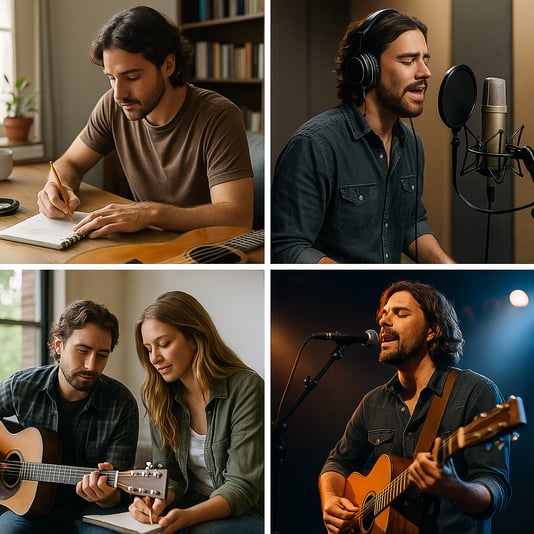How to Transition from Amateur to Professional Songwriter
5/22/20254 min read


4. Monetization Paths: From Royalties to Commissions
4.1 Registering with Performance Rights Organizations
Join PROs like ASCAP, BMI, or SESAC to collect performance royalties from radio, streaming platforms, and live venues. Ensure each composition’s metadata—title, writers, splits—is accurately registered to avoid collection delays.
4.2 Publishing Deals and Synchronization Licenses
Pitch your catalog to music publishers that can place songs in film, TV, and ad campaigns. Research music supervisors on platforms like IMDbPro, and tailor your submissions to match project moods. Include high-quality, industry-standard WAV files and clear licensing terms.
4.3 Direct-to-Consumer Sales and Crowd‑Funding
Offer exclusive content—early demos, lyric sheets, limited-edition vinyl—to fans via Bandcamp or Patreon. Crowd‑funding platforms can finance album production; in return, supporters receive personalized rewards like songwriting credits on hidden tracks.
4.4 Custom Commissions and Ghostwriting
Many brands and individuals seek bespoke compositions for events or marketing. Develop a rate sheet outlining project types—weddings, corporate jingles, or podcasts—and turnaround times. Clear contracts ensure expectations and payment terms are set upfront.
5. Sustaining Growth and Evolving Your Strategy
5.1 Setting Milestones and Analytics Tracking
Define quarterly targets: number of songs written, demo submissions sent, collaborations secured, or revenue benchmarks. Use Google Analytics on your Duda site to monitor visitor behavior, bounce rates, and conversion paths leading to newsletter signups or music streams.
5.2 Embracing Continuous Learning
Stay current with industry trends—AI-driven songwriting tools, new streaming algorithms, or emerging genres. Attend webinars, subscribe to trade publications like Billboard, and join songwriter associations to access exclusive resources.
5.3 Cultivating Resilience and Mindset
Rejection is integral to any creative field. Develop coping mechanisms: peer support groups, mindfulness practices, or routine breaks to recharge. Celebrate successes—no matter how small—to maintain motivation and perspective.
Conclusion: Your Professional Journey Awaits
Transitioning from an amateur to a professional songwriter blends artistic growth with entrepreneurial savvy. By deepening your musical expertise, building a compelling brand, forging meaningful connections, and diversifying income streams, you lay the groundwork for a sustainable career in songwriting.
Inspired to take the next step? Sign up for our newsletter to receive exclusive songwriting workshops, industry interviews, and actionable templates delivered straight to your inbox—your first step toward composing a professional future.
Sign up below and get your FREE Ebook " From Pen to DAW: Mastering Music Composition in the Digital Age”
Writing songs for the joy of creation is fulfilling, but transforming that passion into a sustainable career demands more than raw talent. The journey from amateur to professional songwriter involves mastering your craft, building a distinct brand, cultivating industry relationships, and understanding the business mechanics behind music revenue.
1. Mastering the Craft: Beyond Basic Techniques
1.1 Deepening Musical Theory Knowledge
Delve into advanced harmony concepts such as modal interchange, secondary dominants, and voice leading. These tools allow you to create unexpected chord movements and emotional nuances that resonate with listeners. For instance, borrowing chords from the parallel minor key can introduce a bittersweet quality to an otherwise upbeat melody.
1.2 Storytelling Through Lyrics
Great songwriting hinges on authenticity. Develop compelling narratives by focusing on concrete imagery rather than abstract phrases. Use sensory details—sights, sounds, textures—to anchor emotions in scenes your audience can visualize. Read widely: poetry, memoirs, and screenplays can inspire lyrical approaches and pacing.
1.3 Experimenting with Song Structures
While the verse–chorus–verse format is a staple, challenge conventions by writing songs with unconventional forms—like through-composed pieces or tracks with multiple dynamic peaks. Analyze chart-toppers and indie favorites alike to identify structural patterns that maintain listener interest.
1.4 Incorporating Production Awareness
Even as a songwriter, understanding basic production techniques enhances your demos. Learn about song arrangement, layering of instruments, and the impact of sonic space. Use DAWs (Digital Audio Workstations) to experiment with vocal harmonies, programmed percussion, and ambient textures, making your demos stand out to producers.
2. Crafting Your Brand Identity
2.1 Defining Your Artistic Persona
Reflect on what sets you apart: thematic focus, vocal timbre, cultural background, or personal story. Create an “artist statement” that succinctly conveys your vision and values. This narrative guides your visual aesthetics, from album artwork to social media presence.
2.2 Designing a Professional Web Presence
Platforms like Duda empower you to build a responsive, customizable website. Key pages include:
Home: Showcase a high-quality image, latest release, and newsletter signup prominently.
About: Share your journey, influences, and accomplishments—keep it concise yet compelling.
Music: Embed audio players for streaming or download links, organized by singles, EPs, or albums.
Press Kit: Provide a downloadable PDF containing biography, high-resolution photos, and press quotes for media or booking agents.
2.3 Content Strategy and SEO
Publish regular blog entries or video logs documenting your creative process, studio sessions, or songwriting challenges. Optimize each post with targeted keywords—such as “professional songwriting tips” or “how to pitch songs to artists”—while ensuring natural language flow. Internally link related posts to improve site navigation and SEO authority.
3. Building and Nurturing Industry Connections
3.1 Identifying Key Contacts
Map out songwriters, producers, session musicians, publishers, and managers in your genre. Use platforms like LinkedIn, Songtrust, or local music associations to discover contacts. When reaching out, personalize your message by referencing their work and expressing genuine interest.
3.2 Maximizing Songwriting Camps and Workshops
Invest in immersive experiences where professionals collaborate on original material. Arrive prepared with adaptable ideas, be open to feedback, and exchange contact details afterward. Consistent follow-up—sharing alternate versions or new demos—cements these relationships.
3.3 Leveraging Social Media for Outreach
Maintain an authentic presence on Instagram, TikTok, and Twitter. Instead of generic promotional posts, offer value: share micro-tutorials on lyric writing, behind-the-scenes glimpses, or song snippets that spark conversation. Tag collaborators and industry figures thoughtfully to broaden visibility.
